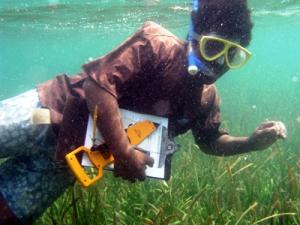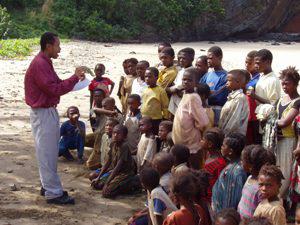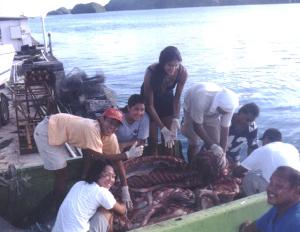Fouad Abdou Rabi, Patricia Davis and Chris Poonian
This work will constitute the first comprehensive survey of the endangered dugong in the Comoros and will result in the formation of a national Conservation Action Plan and community-based monitoring program for this species.

Seagrass survey work.
Mohéli Marine Park was the first Marine Protected Area to be established in the Comoros in 2001. It is home to humpback whales, the endangered dugong and is the third most important nesting site for green sea turtles in the world. Conservation Action Plans have already been devised for the green turtle, the coelacanth and Livingstone's fruit bat; however, no plans have been created for conservation of the dugong despite the fact that this species is globally threatened with extinction. Several researchers have identified an urgent need for conservation plans for this species, although this has been hampered to date by a lack of scientific information.

Children's dugong awareness campaign.
This work will constitute the first comprehensive survey of the dugong in the Comoros and will result in the formation of a national Conservation Action Plan and community-based monitoring program for this species. Data will be collected on dugong status and distribution in order to identify key habitats through a combination of in-situ surveys, literature reviews and community interviews. The project will have far reaching, sustainable consequences, since protection of the dugong will also involve protection of marine habitats which are vital to local communities' livelihoods, through fishing, eco-tourism and other natural resource use.

Autopsy of a Dugong.
The Comoros currently have the least developed marine resource management programme in the Western Indian Ocean. This project will significantly enhance the marine management capacity of the islands through training of governmental, NGO and Marine Park staff. Survey techniques that will be taught during this work include benthic habitat surveys as well as dugong survey, carcass reporting, recovery and autopsy techniques. Dugong Protected Areas will be designated in which gill netting and motor boats are prohibited. A low-cost, long-term community monitoring programme, coordinated by the Marine Park will be implemented. Throughout the project, awareness materials will be produced to explain the importance of dugongs and seagrass ecosystems within the wider context of the Comorian marine environment.